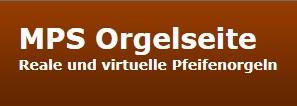- Offizieller Beitrag
Please let us know something about you !
May be you will answer us some of the following questions, or write what ever you want.
- Where did you first hear about GrandOrgue?
- When did you hear about GrandOrgue?
- Do you use GrandOrgue as your only virtual organ?
- What is the kind of your hardware using with GrandOrgue (Computer, Keyboards, e.g.) ?
- Which sample sets do you use with GrandOrgue?
- Which sample sets do you miss for GrandOrgue?
- Are you satisfied with GrandOrgue?
- Do you have some suggestions to integrate in GrandOrgue for the future?
Thank YOU - this may help us and the developers of GrandOrgue,
and will also help you to get most out of your virtual organ in the future.

